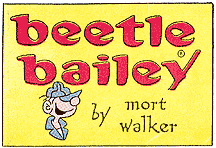|
University Tips Rise and shine!By Ajarn Helen Jandamit Welcome back to University Tips. I hope you had a great mid-year holiday. Perhaps you are puzzled by this week�s headline. Rise and shine is an idiom, often used by the military (the armed forces) or similar institutions, to wake people up in the morning. Well, it�s the start of the second term of the school year and time to wake up after three weeks of relatively easy living. Hopefully, your return to the classroom will not be such a shock as Beetle Bailey�s morning wake-up call. If you are familiar with this comic strip, you will know that Beetle is a very laid back soldier. He�s not very bright and he likes to do as little as possible and sleep a lot. Sarge (short for sergeant) is usually rough with him, forcing Beetle to be disciplined. In this comic strip we see another side of Sarge. As we read along, we understand that something dreadful is about to happen to Beetle Bailey, because Sarge is being so uncharacteristically polite. By the way, 6 am is very late for a soldier to get up. Look at the comic strip and answer the following questions:
1. Which of the following best describes Sarge�s expression in the first frame? a.
Consternation. 2. In the second frame, how does Sarge address (speak to) sleeping Beetle Bailey? a.
He
calls him gently. 3. When Beetle doesn�t respond, what does Sarge do? a.
He
hits Beetle hard. 4. How does Sarge speak in the fourth frame? a.
He
speaks normally. 5. What does Sarge do next? a.
He
pushes Beetle out of bed. 6. What does Sarge do in the sixth frame? a.
He
takes Beetle for a morning walk as the sun is rising. 7. What is the meaning of the term �Here we are� in the seventh frame? a.
We
have arrived at our destination. 8. What was Sarge�s real intention? a.
To
make Beetle�s life pleasant. This second comic strip is also concerned with sleep. The name of this comic strip is Peanuts. Charlie Brown is the boy and the dog�s name is Snoopy. Snoopy is pictured wearing a night cap to show that it is bedtime. In the first frame, we see him looking at bedtime story books. In the second frame, he chooses one.
9. Charlie Brown suggests some bedtime stories to Snoopy. Which of them does Snoopy choose? a. Treasure Island. 10. How does Charlie Brown react to the book that Snoopy has chosen? a.
He
reluctantly agrees to read it. 11. What happens when Charlie Brown starts reading to Snoopy? a.
He
reads more and more quietly. 12. What does Snoopy do when he realises that Charlie Brown is asleep? a.
He
falls asleep too. 13. Why did Snoopy choose the book The Six Bunny-wunnies and their Pony Cart? a.
He
likes the book very much. The Ziggy cartoon below has a theme that is similar to Peanuts. Ziggy is a little, round man who leads quite an uneventful life. Some people record the interesting things that they have experienced every day in a diary (sometimes called a journal).
Look at the ZIggy cartoon below and the answer the questions: 14. How is Ziggy dressed? a.
He
is wearing clothes suitable for going outside. 15. What do the symbols in the thought bubbles of the dog and cat represent? a.
Snoring. 16. Why did the parrot choose to read from Ziggy�s diary? a.
He
knew that the content would be so boring that the dog and cat would fall asleep
quickly. Vocabulary puzzled
(adj): unable
to understand something or the reason for something Idiom laid back: calm and relaxed, seeming not to worry about anything
|
|||||||||||
-- Go to top of the page -
Go to Home page -- |
 |















